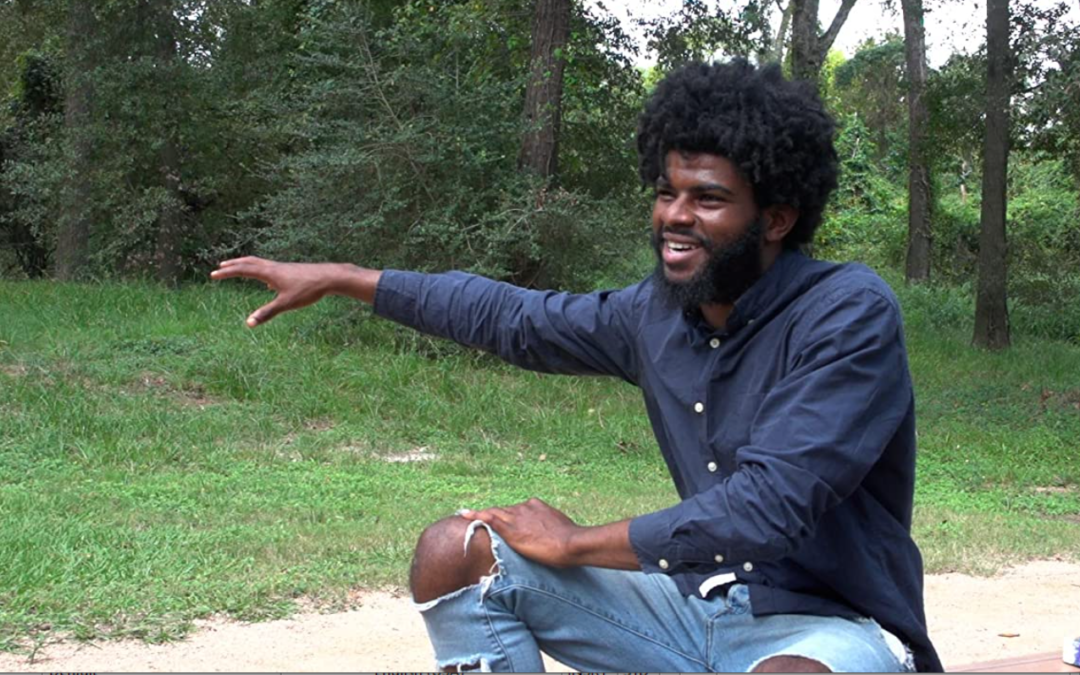(IMAGE: Kodak, a.k.a Joshua J. Kaskin. Copyright Mikell Limbrick)
Sol-Caritas / Amazon Prime. 2021. Documentary. 134 minutes.
RATING: 1.5/4
What is poetry?
That seems like an extraordinarily pretentious question. Indeed, a version of it was once proposed as a topic of dinner conversation by the most pompous individual I’ve ever vacationed with. But it’s an especially relevant one to the documentary P.E.N.S – Poetic Energy Needed in Society. Because as many of those involved will tell you, this isn’t about people reading Shakespeare sonnets. Nor is it ’90s-era Henry Rollins “And then, my friend, you die, man!” spoken word, or even the poetry slams that sprung up around the same time. The particular Houston poetry scene chronicled herein is more akin to hip-hop, with its rhythmic flow and fast “spittin’” style. Yet it’s distinct from hip-hop, as those involved will also tell you.
But perhaps that says more about where hip-hop has gone than anything else. “Alternative rap” bands of yesteryear like Arrested Development would likely feel right at home in this scene. Personalities with names like Lady 380, Scott Free, and Black Snow get up on stage and play to crowds with their personal stories told in rhyme. The most obvious difference is a lack of backing music (though even that’s not a mandate, necessarily), but the more significant differences to the performers is that the material is personal, lays bare emotions that might not feel allowable or manageable in regular conversation, and uplifts the community overall in some way. For performers with a longer view of history, it’s rooted in African rhythms and tradition. And the shows draw lines around the block; the documentary strongly suggests that if all of this surprise you, it’s because it has stayed within the black
community. There are no Eminems or even Pat Boones of this world, though once P.E.N.S. gets more widely seen, the word may get out.
Director Mikell Limbrick has a background in music videos and shorts, and unfortunately, it shows in his pacing. For all the compelling personalities he puts on camera, the structure of this over two-hour movie is simply 20-some short interviews one after the other. A poet announces his or her name, introduces themselves, usually either indoors against a wall of old LP covers, or outside in front of a street art mural. We watch a performance clip. Then back to the artist who speaks a little more. Then on to the next one. Reload, repeat, over twenty times. Any attempt at narrative could have helped a lot, as surely any of these masterful storytellers could have advised. Some external historical context beyond the talking heads, perhaps. Or a contrast between an up and comer putting on shows, versus a veteran with day-to-day coverage of their lives.
One interview in particular, near the end, is rendered nerve-wracking by an unacknowledged chirping smoke alarm that you may worry is your own if viewing the movie at home. Would a replacement battery and a retake have been out of the question?
P.E.N.S. feels like it’s the research for a better movie. Like, now that all the groundwork has been done finding these great personalities, tell a story with them in it. Or figure out a few of them to follow as main protagonists. If nobody wants to participate, tell a fictionalized version. Heck, even a concert movie would work. About an hour and a half in, we get some footage of live poetry at Black Lives Matter protests, and the story briefly seems ready to advance. But then it just goes back to the same talking head format again.
Each personality does display a social media tag onscreen, so perhaps the best use of the feature is to watch at home, regularly pausing, if you’re in search of some poets to follow. Limbrick has done a service in giving them all this exposure; now it’s up to someone even more skilled to create the feature film(s) they truly deserve.
###

